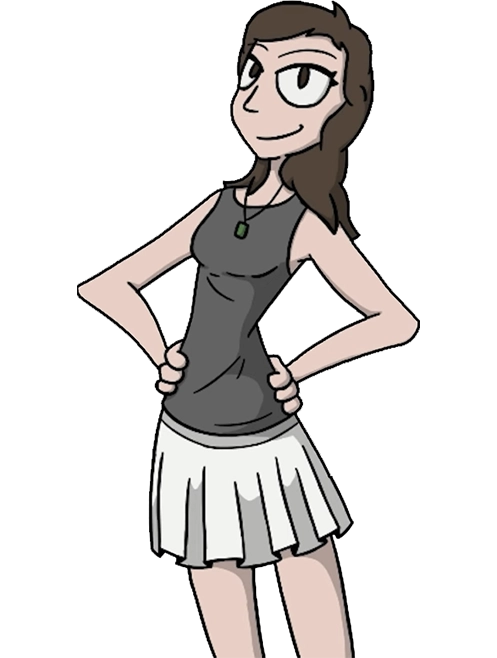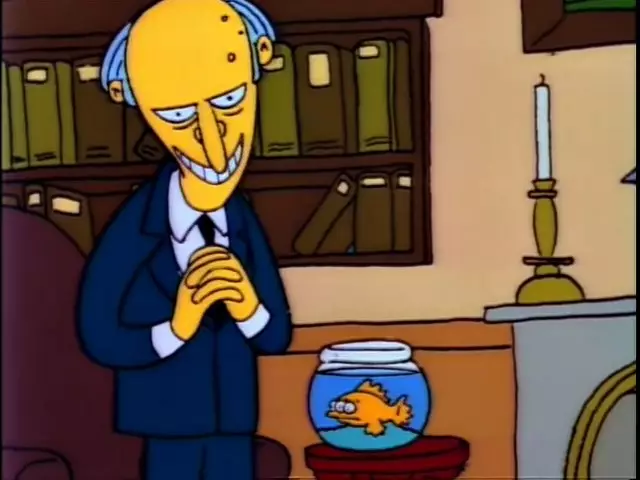My Recollection
Blinky, the three eyed fish! Burns running for governor. The other governor character who I cannot remember and refuse to interrupt this sentence by looking up as she’s just that irrelevant to the series. Beefy? Brainly? Ah, who cares.
I caught a pet cat fish, which once bit my cat cat’s face, the same day I saw a perfectly formed human turd drift down Brisbane river. I want to get one thing straight, you fucking kids today are goddamned spoiled shits when it comes to entertainment. You have no fucking idea how boring things could be before it was all available on the Internet for sorta free. Weed was popular, and I enjoyed it as it made life funnier and hungrier, but even getting stoned would get boring when your afternoon television was limited to a choice between 3 kids shows, the glitchcore madness of a faint SBS signal, and the ironic punishment of an advertorial program called The Great South East whose mission statement was to show you all the fun things you could do around the greater Brisbane area.
There were no phones or anything either, you just had to sit around high and call the first person who said anything a faggot till they chucked an empty 2 litre bottle of coke at you. It fucking sucked and we got fucking bored. One day, the person whose house we were at suggests we go fishing.
The Brisbane river is a shitstreak mobius strip that ensures every part of Brisbane is on the wrong side of it at any given time. I hear tell it used to be blue, contained dolphins and everything, but then whitey dredged all the gravel for driveways and now it’s a large intestine. I mean, I’ll take medicine, refrigeration, and Internet over dragging a fucking sled around the sun bleached Australian desert any day but fucksakes whitey, maybe meet the Aborigines halfway on the not shitting everything up bit.
There’s a bit of the Brisbane river that branches into Oxley creek and near this bit is a jetty the public can use. Upon arrival, we set up the milk crates we’d grabbed from the nearby Asian corner store and got the pipe out. It was in a sock at the tip of a boot a friend was wearing (because nobody wanted to be caught with it) and, as nasty as that may sound, it beat the device we last used to smoke up here.
That was a porous clay bongstrosity that had been hidden in a pile of reeds by the river and filled with Ganges grade Brisbane anal leakage. I got a lung infection and was hospitalised for 3 days, so this time it was the pipe. I wound up being able to use my hospitalisation card to bail on carrying the pipe, though, so it all kind of balanced out. We were high and using spam as bait but at least we were out of the house.
It takes a moment to click that you’re looking at a poo. I mean, think about it, how much poo do you actually see in a given week? Month, even? You never really see poo in the wild, it’s always coiled in a toilet bowl so seeing one all stretched out gives it a majesty that cloaks its true nature.
I can still see the thing because the amount I stared at it, trying to figure out what it was, has burnt it into my mind like it were a bad plasma. When it rains, the Brisbane river gets choppy with various bits that get in it, it hadn’t rained in some time so the surface was like a smooth chocolate mousse. Aside from our occasional line casting, the poo was the only thing interrupting the smooth mousse so we all wound up staring and venturing guesses as to what it could be.
Cat’s tail reed was my guess, I mean, look at the girth of it, no way that came out of a butt.
You remember that sitcom trope of the wife changing her hair and she gets driven mad when nobody notices? The Brisbane teenage stoner equivalent of that is sneaking up river a few meters and dropping serious arse into it, only to have your friends not realise they’re looking at a dump.
Again, this was before the Internet. You kids and your torrents and Netflix and porn don’t know what it’s like to be so bereft of entertainment that you are forced to, even if only on principle, applaud someone else for shitting in a river because, hey, at least he’s fucking trying. And try he did, thing looked like a dead possum wrapped in plastic. It floated around a corner and out of our lives as we turned to bully its father after it occurred to us that he hadn’t possibly wiped.
I’ll never forget you, Shittycheeks.
The Episode
Pinpointing the beginnings and endings of eras in history can be a bit hard when there isn’t some kind of declarative moment like a new lunatic running things. Instead we’re left with vague guidelines that typically erode under close scrutiny. One bold claim, one that I almost adhere to, is that the Middle Ages didn’t end until industrialisation, as only that wave of modernity meaningfully changed the lifeways of the populations it touched.
The Simpsons is no different. It has its distinct phases and, like history, their existence is incontrovertible when one compares the most distant examples. You could show Some Enchanted Evening and Tennis the Menace to someone who knew nothing about The Simpsons and they’d still be able to see the difference. But the closer the episodes, the closer your focus, the less obvious the line becomes as there’s seldom a hard point of change. Occasionally, though, you get something that works as the best of the imperfects and this episode stands as that.
It’s not a perfect line marker, as subsequent episodes continue to shift back and forth, but it’s a remarkable pushmi-pullyu blend of early and classic era Simpsons: something that starts and ends as two distinct entities. At one end is the wackier classic period humour woven into solid character and worldbuilding. At the other is a dry conclusion that completely forgets to resolve plot conflicts, and a slight case of atypical character behaviour.
One time, I tore my foreskin while fucking. It was completely my fault, I could even tell something was gonna give, but it was so damn good up until that point that I couldn’t help but play a doomed game of penis chicken. Flanderisation is similar, an ultimately awful destination at the end of beautiful path. The Simpsons, with its particularly unrealistic art style, starts life in a flanderised version of reality and The Simpsons themselves are a highly flanderised version of a lower middle-class family. The family’s overdone reality — eg. Bart not being merely a disobedient 10 year old but America’s bad boy — is part of what makes The Simpsons a comedy with character depth as opposed to a drama that’s funny. The flanderisation is built into the foundation of the show.
The initially tight focus meant that The Simpsons were a flanderised family juxtaposed against a normal town. They were the comic exceptions, the ones with children who scared normal babysitters, and the rest of Springfield was the straight-man counterpoint. But an ageless cast locks the family into a very small subset of possible sitcom stories and this combined with the animation style’s propensity for more cartoon absurdity (than something animated but realistic, like King of the Hill) to veer the series away from this wacky family/normal town structure. So what began as an absurd family in a more realistic place grew into an absurd family in an absurd place, and this episode features the landmark establishment of that process.
What began as slight hints of infection in other characters becomes a full blown case in Springfield Nuclear Power Plant. In this episode, it goes from just the place where Homer works to a deranged character as shambolic as The Simpsons themselves. Cooling tower cracks sealed with gum, knee deep glowing ooze, the foundational flanderisation has reached out and claimed a new victim. The Simpsons’ penis is still a long ways off tearing, though, so this first step is just very funny.
Deconstructing a narrative text down to its component parts gets you a web of interacting points strung together with an internal logic. In this, character and setting are no different and approaching both this way demonstrates the narrative value of giving your setting character. Now that it has a personality, your environment has more potential points of interaction with your characters and can provide the unusual in ways that don’t clash with a human audience’s inbuilt sense of natural reality. The faults of Springfield Nuclear, though they reflect on Burns as a character are not of Burns as a character or any of the show’s other human agents, they belong to the Plant itself. This allowed for the creation of utterly ridiculous jokes, like Homer finding a colossal spider, that don’t clash with the audience because they come from the Plant as a character instead of the Plant as just a setting. This is a sneaky way of fucking with your reality without having to fuck with your reality. Like with any flanderisation, it will soon tear my penis, but for now it’s a step toward the golden era of The Simpsons where absurdity and narrative existed in harmony.
Speaking of narrative, Bart catches a mutant fish in the radioactive waters of the Plant and the resulting inspection leaves Burns with a repair bill he can’t pay. Homer, meanwhile, has slept through the day and stumbles across Burns drinking his concerns away. Building from an earlier discussion about the governorship with Marge, Homer mentions that Burns could change the laws in his favour and so a deranged industrialist decides to get into politics for wildly selfish reasons. This marks the second time a side character has taken centre stage, the first being Krusty, and Burns is a good choice for it. His placement as dictator over a large portion of not just Homer’s time but his mental real estate gives him a lot of natural contact time and potential as an antagonist, factors certainly exploited over subsequent episodes and put to mostly good use here.
Narrative pivots are a tricky thing. The Netflix Marvel series are good examples of this trickiness and Luke Cage specifically. It spends the opening 8 (or so) episodes building a villain, their relationship with the hero, and greater narrative world before killing him and redirecting the narrative flow. One basically has two options here: conclude the core elements and arcs of this initial portion or weave them into the new. Like surgery, the most skilled at this don’t leave visible marks, Luke Cage failed this terribly and the result is less a single narrative with developments than a truncated main narrative with a quarter of a nose sewn to it. This episode does something similar, the initial conflict of the narrative is the plant being closed down for failing its inspection and this threat is validated to the audience via the episode’s contact point, Burns, and the broader understanding of its threat to the employment of one of the show’s focal characters, Homer.
So the initial issue, Burns being unable to fix the plant, pivots to a new conflict, Burns running for governor. The narrative shifts the episode focus from Burns to The Simpsons and in doing so turns Burns from protagonist to antagonist as his selfish perversion of democracy becomes the episode’s villain. The episode resolves this new conflict and then completely forgets that it was a pivot from an initial issue, the plant being closed, and this idea isn’t brought up again. This is a kind of blithely sloppy artefact of the earlier seasons that later Simpsons wishes it could do. Why bother with crude, winking status quo resets when you can just completely ignore story elements? Burns swears long, complicated revenge on Homer for his family’s part in his downfall and Marge makes it all better by reminding him that his life is so small Burns couldn’t hope to crush it. It’s a combination of sloppy and rushed, the narrative equivalent of a back alley doctor leaving his shot glass in you when he sews you up. What early seasons did with just not giving a fuck, later seasons did with grotesque meta and these bookend the golden age where the writers cared enough to better organise their plots.
This narrative laziness is the prime signifier of “early Simpsons” in this two headed beast but the other is Marge having something close to a normal spine. She largely exists in only two states: smiling doormat or near total breakdown. To be fair, some of this is definitely an issue with the core nature of the show. Most of the character shenanigans are wildly outside of what a wife and mother would put up with but she can never leave or meaningfully change her sitcom prison. Previous episodes proved that Homer can’t become the better man he wanted to be, so they killed that and left only a buffoon. Similarly, Bart’s actual child elements can never mature so they just die and leave America’s Bad Boy. As the boys grew dumber, Marge matched them and what began as love conquering trouble became delusional Stockholm syndrome. This pressure needs release, though, or the absurdity will grow too visible and smother the character altogether. So, similar to how Bart is occasionally tortured as punishment, Marge gets to vent her doormat existence with the occasional screaming breakdown episode.
This isn’t that. This is early seasons Marge, a woman who has an actual political opinion that meaningfully differs from her husbands and one that she stands up for. Through this she becomes the story’s quasi-hero, using her housewife powers to bring down the sinister Burns. This casts Homer as an unwitting tool of evil, and thus part of the problem, but does that in a way that ignores a few realities. A bit like when a drunk woman doesn’t realise her screaming in a cab line is about to get her boyfriend into a fight, Marge doesn’t seem to care that Homer’s support of Burns is to do with knowing his job is on the line and not because of any shared politics. Her passive-aggressive serving of Blinky is cast as heroic but it only manages this by ignoring Homer’s genuine fears for his ability to support his family and by completely ignoring the threat instead of resolving it. Marge reminds Homer that one of his dreams, seconds on dessert, is so small no man can crush it but as unemployment can directly threaten dessert purchase the line is just a crude way of shifting the audience focus to the spousal conflict elements in the hopes that nobody notices the larger, unresolved ones.
Golden age Simpsons is a period when the character and comedy operated together and made a whole greater than the sum of the parts. Two Cars in Every Garage and Three Eyes on Every Fish is a bit like legion testing the brain, ultimately ugly but the scar tissue shows us how the two parts originally fit.
Yours in having a taste that can’t be beat, Gabriel.
Jokes, lines, and stray thoughts.

The old axiom is a little off the mark as I could spend more than a thousand words on this image alone. It is exactly one frame and it’s perfect. Later episodes seemed to coalesce around a standardised eye bug level and I can’t help but wonder if this was the catalyst. You can make it out in the episode too, but you need to pause it to witness the glory.
—


This contrasts with another fun image and moment a mere few seconds earlier as Shutton stops his car, walks toward two children, and starts questioning them about their day. This is an event that sits nicely on the sizzling rift between perfectly normal and fucking weird. I mean, it’s not weird, you can talk to kids, so what? But it’s also really fucking weird, what are you going to stop your car and talk to kids about? It’s an awkwardness the kids are aware of as they turn to address this event before staring straight ahead and hoping it will just go away.
—
The Nuclear Inspectors show up a few times and are usually hilarious. This entire sequence has a sequel in the amazing Homer Goes to College but a lot what makes that bit funny is established here. The jokes are a great mix of sight gags and Burns’ weak defences, but with each growing stronger and weaker over their course. Each a well structured melody that gets a boost when harmonised by counterpointing the other. The final joke, Burns not even bothering to address the knee deep radioactive goo, can then exist as both comically dry and comically wacky without jarring the reality.
—
The cynicism the show has to the democratic process in the US, back in 1990, is almost quaint now. Look, a millionaire/billionaire is running for office in a blatant attempt to secure favourable laws for his own interests using simple slogans and manipulative media practises. Ha, what a lark.
—

For reasons known only to the animators, Grampa spends the episode as Colonel Sanders.
—
I feel like there’s a near Leopold Bloom level path taken around Springfield by Blinky and this episode shows us only tantalising glimpses of it. Blinky starts life in the Old Fishing Hole, is caught by Bart, shows up later in a bowl with Mr Burns, and is then acquired and cooked by Marge. The story treats each instance as the one fish, so I’ve ruled out a whole indistinguishable species living in the pond, and its ability to be anywhere it’s needed to be with no explanation is another example of early season lazy plotting.





2 replies to Two Cars in Every Garage and Three Eyes on Every Fish
Alex on 13th February 201813 Feb 18 said:
Ain't nothing funnier than a good old fashioned poop and fart story. The longer and more eloquent, the better. Gabe talking about poops never fails to make me cry laughing.
A minor thing that struck me as a bit odd is the way the reporter spins Blinky around each time he counts an eye off. It's also a bit jarring watching some of these early season episodes and seeing how often Burns drives himself around, sometimes with Smithers as well, that seems like one aspect they dropped pretty quickly to play into his weak, dependable character archetype.
Gabriel on 13th February 201813 Feb 18 said:
There's a few odd things like the Blinky spin that are so specific yet meaningless that they've driven me mad. There's lines in $pringfield and The Springfield Connection that have stuck with me for years even though they're very, very meaningless.
Burns' frailty is another one of those rubber band reality elements where he's as feeble as they need him to be. Even when it's the focal point of an episode, it's almost always immediately counteracted. Once it hits dumb joke status they stop caring about it as a stable character trait.
Comment on Two Cars in Every Garage and Three Eyes on Every Fish
To reply, please Log in